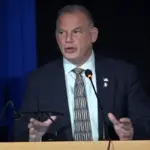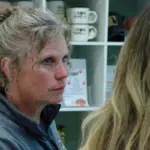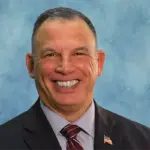by Linda L. Esterson, photography by Nikola Tzenov
While an undergraduate psychology major at Salisbury University, Katie Kirby worked at Urban Ministries, which provided an after-school youth program that supplied dinner and homework help to children who were homeless and living in poverty.
One of the children, an 8-year-old girl, “had pretty much every risk factor going on.” Her father was imprisoned, her mother worked three jobs, her sister endured a lifelong health condition and her brother, 18, had been sentenced to 16 years in prison. Disheveled, with unkempt hair and pants that were several sizes too small, she was a target for bullies and often disciplined for fighting.
The girl was failing academically and likely would be required to repeat second grade. Kirby met with her teachers, helped with schoolwork and provided clothing and food for her family. Then they were evicted and moved to a new school district, without a similar program.
“I remember going home that night knowing tomorrow was her last day and thinking, ‘What do outcomes look like for her, what’s next for her?’” Kirby said. “I just couldn’t see anything positive unless she had support, like what we were providing through the program.”
Kirby failed to find another program to help the girl, so she created a new program instead. With paperwork signed, Kirby filed for nonprofit status; Together We Own It became official in December 2015.
After more than a year, the girl learned to read and spell and her grades improved. Kirby also provided support with meals and paired the family with local services to alleviate other stressors that challenged their survival. Today, the girl successfully attends middle school. She and Kirby talk monthly.
Kirby said she grew up in Westminster, pretty “well off, with blinders on as a kid.” While she said she remembers her family adopting other families during Christmas and generally helping others, she can’t point to an Aha! moment that put her on this path. Positively impacting individuals and her community is just ingrained in who she is.
“It took me experiencing another community to recognize poverty and childhood trauma and all of those other things that exist,” said Kirby, a 2014 Westminster High School graduate. She keeps a “little black book” chronicling her work with local children. “I know the story of every single one. They aren’t just names on a page or binders on my shelf to me. They matter.
“It’s personal because I recognized the injustices within our child welfare system, but more importantly, I recognized that my voice was my superpower. I could stand up against injustice for them and fight for a better tomorrow, which is what they all deserve.”
After graduating in December 2017, Kirby returned home, near her boyfriend (now husband) Bryce Speert, a junior prom blind date that transformed into a relationship 10 days later. They moved to Harrisonburg, Va., in August 2018, and Kirby endured a 2.5-hour commute three days each week. After two years, they moved closer, to Hanover, Pa. She turned her attention back to her hometown, wanting to continue making a difference.
In Westminster, Kirby met with everyone she could in government agencies, foundations and local businesses to support families in Carroll. She filled her trunk with donations of school supplies and clothing, driving to shopping centers to share with needy families.
“It opened my eyes to so many things I wasn’t aware of,” she said. “I decided we absolutely needed something like this here, we need something that focuses one-on-one with our kids and provides for the whole child. We need not just an after-school program but something that’s going to be involved in the family’s lives, provide advocacy, be their voice, support them in so many ways.”
In May 2018, she leased an office on Main Street in Westminster, and two years later expanded to space four times the size on John Street. With four employees and a volunteer base of 60, Together We Own It serves an average of 700 children each year with group mentoring, one-on-one mentoring and basic necessities like clothing, personal hygiene items, meals and school supplies. On site are a thrift store and a food pantry.
Staff members meet with families to determine stressors and barriers to success. If a child regularly misses school, for instance, Kirby gives the family an alarm clock.
“We break down the basic needs of this family to help them,” Kirby said. “We can’t ask people to achieve goals and work towards achieving goals if we don’t provide their basic necessities.”
Hungry children have difficulty learning, so they provide food. And they watch for signs of other needs.
“We hear a kid doesn’t have a pencil, and we look 10 steps back,” Kirby said. “What else is in this kid’s life that we can support and provide? … How else can we support the family?”
The goal is to help families become self-sustainable. Parenting and support groups, budgeting assistance and referrals to other programs provide the tools they need to move from “surviving to thriving.”
With COVID-19, total numbers served ballooned to more than 3,000 during the first nine months of 2020, as now separate programs host elementary and middle/high school students, and the organization serves breakfast, lunch and dinner, Mondays through Thursdays. When the virus shut down schools and businesses, Kirby shifted from programs to delivering groceries, serving 4,600 individuals from March to May. When schooling went virtual, Kirby created Turning Tides, opening her doors to students with 504 plans (for children with disabilities) or Individualized Education Programs who needed support with virtual learning. The traditional programs continue during evening hours on a limited basis, due to government restrictions.
In the spring, Courtney Fenske delivered a baby. With the infant, a toddler and her husband employed outside of the home, little of her son Ethan’s schoolwork was completed. A learning disorder and ADHD presented added challenges for the boy. Unable to keep up with the work, Fenske enrolled Ethan in the Turning Tides program, where he got virtual learning support from teachers and peer mentors. The program, provided free of charge, enables Ethan to complete his online learning and homework as well as spend recreational time with other students.
“It’s not that he isn’t bright or smart, it’s just that he learns in a different way than some students do,” Fenske said. “We need that extra support from an adult to help him. … It really has been a lifesaver for us.”
During the organization’s first three years, Kirby relied on individual contributions for funding. Today, half of the funding comes from the Governor’s Office of Crime Control and Prevention, enabling the focus as a juvenile diversion program working with children engaging in risky or criminal behaviors to help them redirect to become productive, contributing citizens. Other agencies provide additional grants.
Kirby participates on the Carroll County Local Management Board, a group of about 15 child service agency representatives. Members of the board, including Kirby, also serve on a local care team, a multi-agency work group that meets with families with children experiencing extreme challenges. According to Corey Hardinger-Wilt, the board’s manager, the care team refers children with behavioral, mental health and family issues to Together We Own It.
“Katie’s group provides these kids with a safe place to go to process through their current situation, connect with other kids like themselves, receive social-emotional support, help with school, connections with food. Her organization meets kids where they are and really tries to help them come up with a plan to move forward.”
Hardinger-Wilt met Kirby during her early networking push and found her genuine and in the field “for the right reasons.”
“She very quickly proved that she had found a niche for some kids who really were kind of being left behind a little bit, and was really committed to serving those kids by just being there for them, non-judgmentally. I was completely blown away.”
Kirby’s five-year plan includes purchasing property and expanding the operation to a campus with a school and emergency respite housing.
Now 24, Kirby continues her community service commitment that blossomed at Salisbury. While a student, she coached basketball for the Salvation Army, built houses with Habitat for Humanity, served at a soup kitchen, was president of Salisbury University’s Student United Way, and more. Today, she juggles many commitments including managing extensive programs and grant writing, and is enrolled in an online doctorate program through Liberty University. She admits she gets little sleep.
“Somebody said I need a cape,” she laughed. “I really just need a nap.”













